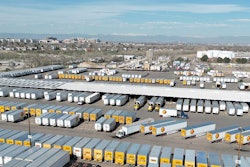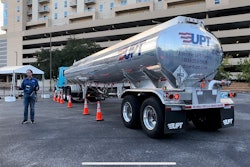It’s often presented as a joke when someone says, “I’m from the government and I’m here to help.”
But sometimes that’s true, and when it comes to trucking cybersecurity, it’s true to a surprising degree.
Those of us who attended the National Motor Freight Traffic Association’s recent Digital Solutions Conference on Cybersecurity in Houston got a first-hand demonstration of just how committed the federal government is to fighting cyberattacks against our industry – and just how many federal agencies are involved in the effort.
It’s an impressive list. Attendees heard presentations from the Federal Bureau of Investigation (FBI), the U.S. Secret Service, the Transportation Security Administration (TSA) and the Department of Homeland Security’s Cybersecurity and Infrastructure Security Agency (CISA).
Each agency has its own distinct role, and sometimes the agencies intersect with each other.
The mission of CISA is to collaborate with the private sector to enhance its resiliency against cybersecurity threats. CISA helps private-sector companies by assessing their level of risk, promoting best practices and strategies, helping to build security capacity, and often providing support in the event of a breach (although most of the time CISA’s interaction with businesses happens before a breach).
The Secret Service is mostly known for protecting the president, but it has a critical function in cybersecurity – including investigations that help protect the nation’s financial infrastructure and payment systems. This includes the targets of ransomware attacks, which have included some major players in the trucking industry in recent years.
When the Secret Service uncovers information that relates to a federal crime, it turns the information over to the FBI, which is the lead agency for cybercrimes.
The TSA is mainly known for running those annoying stop points at airports, but it does far more than that. TSA assists with cybersecurity assessments and training, with particular emphasis on the role of people and security awareness. One of TSA’s top priorities right now is helping transportation companies who are particularly vulnerable to cyberattacks because they are still using older technologies at the asset level.
At the conference, NMFTA had representatives from all four agencies on stage at the same time, discussing how important the trucking industry is to the nation and emphasizing that is exactly the reason they took the time to attend.
It makes sense, of course. The trucking industry was recently designated by the federal government as part of the nation’s critical infrastructure, which gives us access to a variety of resources that can help us fend off attacks. Many of those resources were on the stage in Houston, letting us know exactly what we can do to protect ourselves, and who is there to help us in the effort.
Before I joined NMFTA earlier this year, I was an active practitioner with the Metropolitan Atlanta Rapid Transit Authority (MARTA), working daily to keep the transit system safe from cyber threats. During that time, I coordinated with all the agencies mentioned and made good use of many of their security tools and threat intelligence services. In my current role as director of enterprise security, I’m working to introduce the trucking industry to these same resources. That is the primary reason we asked these agency representatives to join us in Houston. It wasn’t hard to get them to agree. This is their mission and they’re very dedicated to it.
Trucking companies who want to learn more about working with the federal government to fight back against cyberattacks can visit this blog post by NMFTA for details and contact information. You can also learn about some of the specific resources, and click through to them, by visiting this blog post NMFTA published in July.
The trucking industry needs to do a lot to stay on top of cybersecurity concerns. It needs to implement more security measures to protect itself both at the enterprise and asset levels, and it needs to work hard to instill company cultures that put cybersecurity front and center.
But it makes a big difference to have help. The resources of the federal government are vast, and the knowledge of these agencies is extensive. Between the insight they can offer, the investigative power they can wield and the law enforcement authority they can exercise when needed, these federal agencies are critical allies to the trucking industry as we work to ensure we can operate safely in this digital age.
They really are from the government, and they really were there to help.











